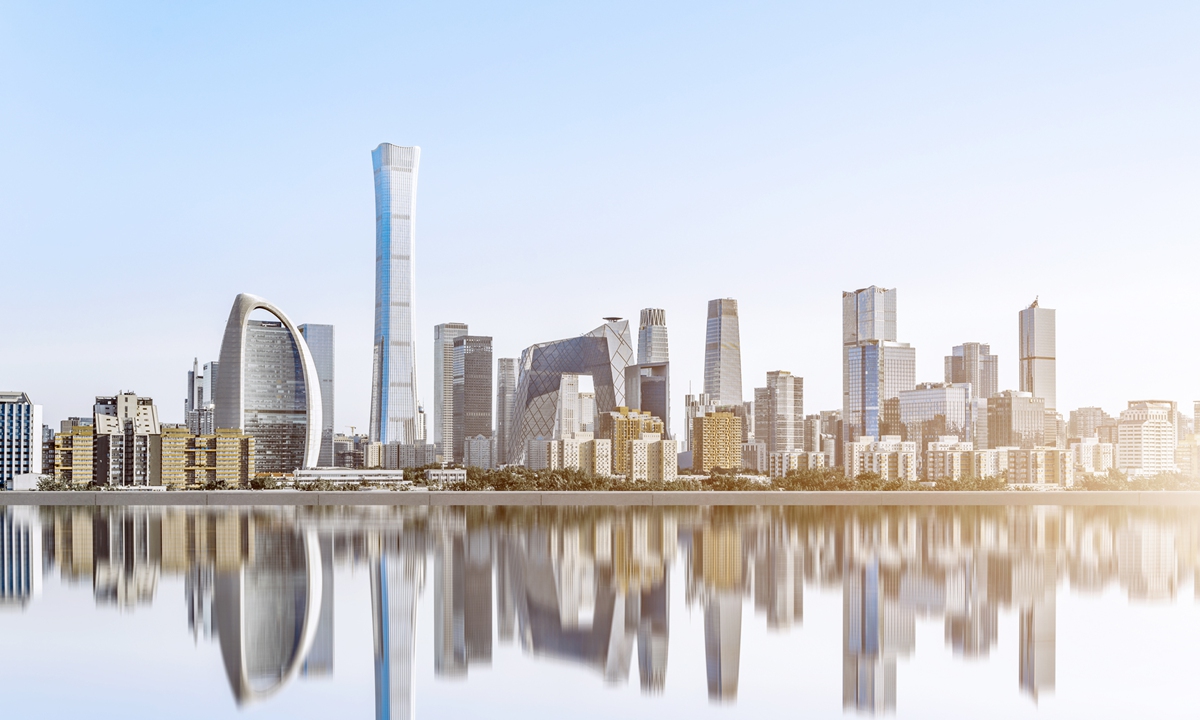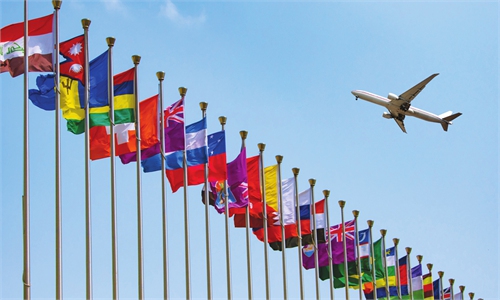
Photo: VCG
Editor's Note:
For the Chinese people, the past decade was epic and inspirational. The country, under the leadership of the Communist Party of China with Xi Jinping at its core, has made great endeavors in boosting its economy, deepening reforms, improving the rights of its people and acting as a responsible power globally.
Currently, the world is turbulent and faces the tough questions of "what security ideas should the world embrace" and "how countries can achieve common security." In this respect, China offers its own answers by sticking to its own security formula. How should we view China's idea of "enriching the state and strengthen the army?" How important is the modernization of the PLA? The following article sheds light on these questions.
This is the 10th of the series about this special decade.
Summarizing Chinese security policy inevitably will hit upon the formula "Enrich the state and strengthen the army," which runs through the entire history of China.
In the past China repeatedly paid a high price for giving priority to build a flourishing civil society first before securing the means to defend it. Again and again a prosperous China became a target of neighboring states and remote colonial powers. Due to insufficient defense capabilities, these countries carried away what was useful to them and destroyed what could not be removed.
These historical failures have taught important lessons. In order to enhance its defense capabilities, China for a long time erected walls all along its land borders. However, these unified defense measures were not always successful. But even after temporary splitting and periods of domination by foreign rulers, China has always found itself together in renewed unity and preserved the size of its empire. It is this impressive continuity which has made China rather unique in the world.
The Communist Party of China (CPC) was founded in 1921 in the final stage of another extended period of oppression and humiliation in recent history. By providing a convincing vision of a New China, the CPC managed to attract the suffering masses from various strata of Chinese society and establish itself as the leading political force. To implement this goal, the Party understood the necessity to create an army of its own to overcome the Kuomintang and warlords as main adversaries in the civil war as well as foreign aggressors from Japan and other countries. Thus, in 1927 the Party created an armed force of its own.
Former leader Deng Xiaoping launched the policy of reform and opening-up to the outside world in 1978. To reach this goal, he promulgated the "Four Modernizations," meaning the modernization of science and technology, agriculture, industry, and defense. It is significant that defense takes the last position. This matches perfectly the traditional notion of first enriching the state and only afterwards strengthening the army.
Let us turn again to the build-up of the Chinese People's Liberation Army (PLA). After the CPC assumed power, the Soviet Union carried the hope to exert control over the PLA and bind it into a Moscow-led collective defense system. The CPC never thought to comply with such an endeavor and successfully maintained its independence. No effort has been spared to implement and defend this policy. It was in 1970 when China successfully completed an important step toward military modernization. This was announced as "Two bombs and one satellite" hinting at the capability of handling the fission and fusion technology of nuclear warheads as well as the capability to produce missiles as carrier vehicles for these weapons by launching a satellite. Although China gradually increased its arsenal of these weapons, it solemnly declared it would never be first in applying them. The continued enormous progress in the development of China's economy has provided solid fundamentals for the comprehensive modernization of the armed forces.
In the process of opening up to the outside world, the PLA has engaged in United Nations peacekeeping operations for more than 30 years. It started with bridge building and other infrastructure projects in Cambodia and has meanwhile been extended to more than 20 countries, mainly in Africa. Chinese troops have participated in 25 UN peacekeeping missions so far, deploying 50,000 men and women of which 16 have sacrificed their lives. Currently there are 2,240 Chinese officers and troops serving in UN peacekeeping operations and at UNHQ. As regards the contribution of military personal, China is at the top among the five permanent members of the UN Security Council and takes rank 10th position among all UN member states. It is highly noteworthy that the participation in these international missions clearly has proven China's determination to contribute to the building of a more peaceful and safer world.
It must not be overlooked that the modernization of the PLA first and foremost is pursued to serve the needs of the country. When the PLA celebrated its 90th anniversary in 2017 it showed an overwhelming display of modern weaponry which might have left some foreign observers uneasy. However, China has clearly stated that the purpose of this arsenal is only to protect China's core interests and territorial integrity. China's rise is peaceful and poses no threat to any other country. If confrontation should occur, then it will not be caused by China, but by foreign countries, particularly by the US.
This is not a new phenomenon at all. After the US completed the occupation of its continental territory in the 19th century, Admiral Alfred Thayer Mahan expanded the "Go West" strategy to the sea and claimed the whole Pacific Ocean up to the coast of China belonged to US jurisdiction. Deriving from this imperialist legacy, the US assumed an obligation as a global maritime police force. Time and again the US has expressed worries that China might close shipping lines through the South China Sea and the Pacific Ocean. This is groundless and untrustworthy, because it would diametrically run against Chinese interests. The project of the Belt and Road Initiative, particularly its maritime component, shows clearly that China pays great attention to unimpeded international navigation at sea. While the US as a self-declared policeman pretends to implement the United Nations Convention on the Law of the Sea, it has itself never ratified the agreement. The US has used for decades the Philippines and other countries bordering the South China Sea to challenge the sovereignty of China over the South China Sea. Ancient Chinese maps dating from the Song Dynasty (960-1279), produce irrefutable evidence that the archipelagos in the South China Sea have been part of China.
Taiwan for a long time has been a target of dispute between China and the US. When former US president Richard Nixon visited China in 1972, he signed the Joint Communiqué with premier Zhou Enlai in Shanghai. The US thereby acknowledged that there is but one China in order to pave the way for mutual recognition according to international law and to open diplomatic relations. But this has not prevented the US Congress from unilaterally promulgating the Taiwan Relations Act permitting the US government to continue the conclusion of profitable arms deals with Taiwan. Simultaneously, the US has supported activists of "Taiwan independence" at times discretely, at other times loudly provoking, sowing discord between China and the US and turning the Taiwan question into a stumbling block in bilateral relations between the two countries. Apart from 50 years of Japanese colonial rule which ended in 1945, Taiwan has always belonged to China. Taiwan thus being part of China is longer than the existence of the US as a sovereign power.
Under the leadership of the CPC, China has become the second-largest economy in the world. Former US president Donald Trump said: "There are some people who wish I would not refer to China as our enemy. But that's exactly what they are." Whereas Trump made this statement at the beginning of an emerging trade war, his successor President Joe Biden increasingly refers to China as a political enemy. Former Australian prime minister and China expert Kevin Rudd goes even one step further and speaks of the inevitability of war between China and the US.
Under such circumstances it is understandable that China takes efficient measures to defend itself. General Secretary of the CPC Central Committee Xi Jinping is deeply committed to the Chinese Dream, to the rejuvenation of China, whereby the basic mission of the CPC currently consists of the preparation of means to protect the prosperity of the nation. So far, there has been no reason to doubt the peaceful character of China's rise or that it might turn into a threat. China has been respecting its borders and will not be crossing them. China is by nature a peace-loving country.
The author is former Swiss Defense Attaché to China. opinion@globaltimes.com.cn

